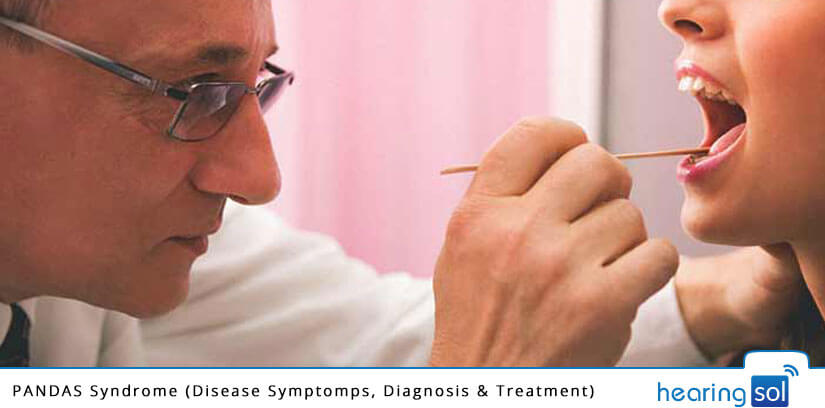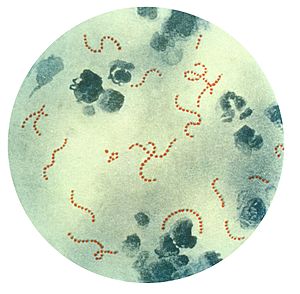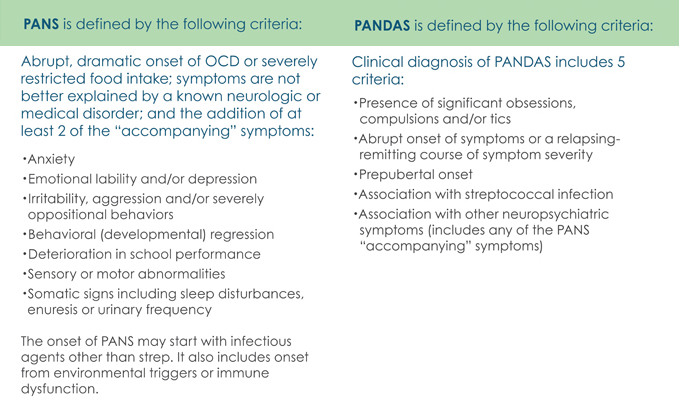
Pediatric autoimmune neuropsychiatric disorders associated with streptococcal infections (PANDAS) is a hypothesis which occurs when strep triggers a misdirected immune response results in inflammation on a child’s brain. It involves a sudden change in the personality and behavior of children.

It is diagnosed effectively after a patient starts developing a number of symptoms(physical as well as behavioral) following a streptococcal infection. Strep infections can be mild causing severe strep throat, scarlet fever, and other illnesses.
What you will learn about PANDAS disorder:
The actual cause of PANDAS disease is unknown. But research study suggests that a strep infection is responsible for causing an abnormal immune response. It results in neuropsychiatric symptoms.
If you need any assistance or have a question about PANDAS Syndrome, you can consult our HearingSol experts with your problem, feel free to call us on +91-9327901950. We are always here to help you.
PANDAS disorder brings about a warm feeling when you’re talking about the syndrome.
It causes an overnight onset of “what demon took over my normal, healthy child?” It is a rare condition that demands the serious attention of parents towards their children’s diagnosis and treatment.
History Of PANDAS Disorder
PANDAS was first described in 1994 by Susan Swedo(MD as well as chief of the pediatrics and developmental science branch) at the National Institute of Mental Health in Bethesda, Maryland.
The investigators detected a sudden onset of obsessive-compulsive disorder (OCD) symptoms, vocal and motor tics, and other behavioral changes in a subgroup of children.
It was observed that a recent or active infection grew with a beta-hemolytic Streptococcus, the bacteria that causes strep throat. They discovered a new subtype of OCD, in children where they found the antibodies.
These antibodies produced in response to strep infections that attack healthy cells including brain cells known as the basal ganglia, which is related to behavior and movement.
Researchers also identified some other infections as well but the PANDAS diagnosis is limited to streptococcal infections.
At last, she concluded, “The end result is that it restarts the child’s immune system and stops the dysregulation causing the issues.”
PANDAS Criteria
The sudden acute and debilitating onset of intense anxiety and mood liability in association with a streptococcal-A (GABHS) infection is the hallmark trait for PANDAS.
The onset will be 4 to 6 months in some cases after a strep infection. It is because the antibiotics did not fully suppress the bacteria.
Below is the symptom criteria for PANDAS:

Symptoms Of PANDAS
PANDAS symptoms start abruptly about four to six weeks after a strep infection. It may last for weeks or years due to acute arrival but it often disappears or declines over time.
It is similar to obsessive-compulsive disorder (OCD) and Tourette syndrome. If they are untreated with antibiotics then it may give rise to other infections too.
They typically last from several weeks to several months. These symptoms have been grouped into two categories. One is the psychological symptoms and the other is physical symptoms.
Psychological Symptoms
- obsessive, compulsive, and repetitive behaviors
- separation anxiety, fear, and panic attacks
- incessant screaming, irritability, and frequent mood changes
- emotional and developmental regression
- visual or auditory hallucinations
- depression and suicidal thoughts
Physical symptoms
- tics and unusual movements
- sensitivities to light, sound, and touch
- deterioration of small motor skills or poor handwriting
- hyperactivity or an inability to focus
- memory problems
- trouble sleeping
- refusing to eat, which can lead to weight loss
- joint pain
- frequent urination and bedwetting
What Causes PANDAS Disorder?
The exact cause of PANDAS is still unknown. Research is going on to know about its causes. But the common opinion is that it is caused by an autoimmune response to a strep infection.
Actually, the strep bacteria are good at masking itself from the immune system. The reason is that they are similar to normal molecules found in the body.
Normally, the immune system releases proteins called antibodies to fight off the infection whenever a person is exposed to bacteria.
We can say that when a group A streptococcal infection (strep infection) triggers an abnormal immune response, it causes the body to mistakenly attack the tissues of the central nervous system (brain and spinal cord).
As a result, it may cause PANDAS. Antibodies targeting the basal ganglia implying the particular part of the brain may cause the neuropsychiatric symptoms of this syndrome.
How Is It Different From Autism?

Children with autism are least affected by PANDAS as compared to other children. This syndrome is usually more difficult to detect in autistic children.
This is due to the overlapping symptoms. It may also be mistaken for classic OCD and we know that classic OCD commonly co-occurs with autism.
What exactly creates a difference between PANDAS and autism symptoms is the sudden onset of symptoms.
These symptoms can be new anxieties, mood swings, increased stress levels, and compulsive behaviors, etc.
Essentially, these symptoms are often those symptoms that are not commonly seen with classic OCD. It includes sleep difficulties, loss of bladder control, behavioral regression, and loss of appetite.
Also, many children suffering from PANDAS also develop odd movements like tics, irritation, more sensitive to loud noises, or other stimuli.
How To Diagnose PANDAS?
PANDAS diagnosis is done clinically, calmly, and effectively. It requires a careful medical history and physical examination of the patient.
Currently, there are no fixed diagnostic laboratory tests for this disease but still, there exist certain criteria that aid doctors in making their diagnosis.
Diagnosis Criteria:
- sudden onset and/or symptoms vary in intensity
- worsening of already existing symptoms, with the severe symptoms
- obsessive-compulsive behaviors, tic disorder, or both presence
- neuropsychiatric symptoms, such as hyperactivity, mood changes, or anxiety
- previous or current strep-A infection
- More chances of being between three years old and puberty
PANDAS Syndrome Treatment
As we know that PANDAS involves both physical and psychiatric symptoms. Therefore, it’s treatment requires addressing both symptoms.
Treating The Strep Infection
Antibiotics treat strep infections. With a single course of antibiotics, there is a possibility to successfully treat many strep infections.
Some of the antibiotics used to treat strep infection are:
- Amoxicillin
- Azithromycin
- Cephalosporin
- Penicillin
Treating psychological symptoms
They may start to improve with antibiotics. But it may require to focus them separately. Doctors use cognitive behavioral therapy to treat such symptoms and OCD. OCD usually responds well to selective serotonin reuptake inhibitors, a type of antidepressant.
Some common ones include:
- Fluoxetine
- Fluvoxamine
- Sertraline
- Paroxetine
Initially, a doctor prescribes to take these medications in small doses. In case of an emergency only, they suggest patients increase their dosage.
FAQs
Are there any potential complications?
Symptoms of PANDAS can even make your child disable to function whether at school or in social situations. Untreated symptoms can make it worse too.
This may result in cognitive damage. This syndrome doesn’t link with the development of heart issues as observed in children with rheumatic fever.
Undetected PANDAS may enhance the risk of having OCD as well as tic disorder into adulthood.
What is the prognosis of PANDAS?
We know that strep infection is somewhere responsible for PANDAS. Also, PANDAS recovery is possible. Though some children completely recover from PANDAS.
Yet, some others can even become a victim of the neuropsychiatric symptoms after each strep infection.
What are the long-term effects of PANDAS syndrome?
According to doctors watching PANDAS patients over the last decade, there are many factors which can push PANDAS patient towards the stage of severity. Like a number of recurrences, family history, and many other factors.
When it comes to severe cases, it takes time to heal this syndrome. The results of each child are unsure. But you know what most parents agree that by puberty if PANDAS treatments are properly used for affected children, they give positive outcomes.
These treatments include antibiotics at each exacerbation or IVIG or PEX in another case. It is difficult to monitor the proper function of the basal ganglia.
That’s why doctors have not yet discovered the persistent symptoms related to dysfunction.
Can It Be Possible To Prevent PANDAS Syndrome?
The answer is Yes. You can prevent it. Children diagnosed with PANDAS don’t need to worry. There is full-proof evidence that some prophylactic antibiotics play a vital role in preventing the development of strep infections. And therefore the worsening of symptoms. There is the true real-life story of its recovery.
Watch this video… “TRUE STORY OF RECOVERY”
Find Specialists
You can look for doctors or other health professionals if you need medical advice regarding PANDAS. Or those who have experience with this disease.
There are many specialists that you can find through advocacy organizations, clinical trials, or published articles in medical journals.
Sometimes, you may also need to contact a tertiary medical center in your area. It may be because these centers tend to have the latest technology and treatments.
Try contacting national or international specialists if you can’t find a specialist in your local area. They may help you through conferences or research efforts.
Research & Study
The answer to this question is yes. The 2015 JCAP Special Edition is the first research paper written by a Consortium of researchers and physicians on PANDAS/ PANS. Its main aim was the advancement of treatment and research for those suffering from PANDAS.
Clinical Trials
Azithromycin Study
This research study took place to know whether antibiotic named azithromycin got approved by the U.S. Food and Drug Administration (FDA).
Treating infections, improving symptom severity in children with severe PANDAS were other goals of this study by researchers. For more, Read Clinical Trial Page
NIMH IVIG PANDAS Study
It was the second study done by the researchers to test the safety and effectiveness of intravenous immunoglobulin. Basically, it was done for treating obsessive-compulsive disorder in children with PANDAS. Read Clinical Trial Page.
Conclusion
PANDAS Syndrome is a rare disease. But there is no need to worry since its treatment, preventions are present. Causes of PANDAS are still in progress.
Research is going on to brief you all about its exact causes. But still, there exist some criteria for its diagnosis and treatment. We hope after reading the above article, you got a complete guide of PANDAS.
If you need any assistance or have a question about PANDAS Syndrome, you can consult our HearingSol experts with your problem, feel free to call us on +91-9327901950. We are always here to help you.

 Reviewed by Mr. Ranjeet Kumar
Sr. Audiologist, Speech Therapist & Cochlear Implant Specialist, BASLP on
Reviewed by Mr. Ranjeet Kumar
Sr. Audiologist, Speech Therapist & Cochlear Implant Specialist, BASLP on